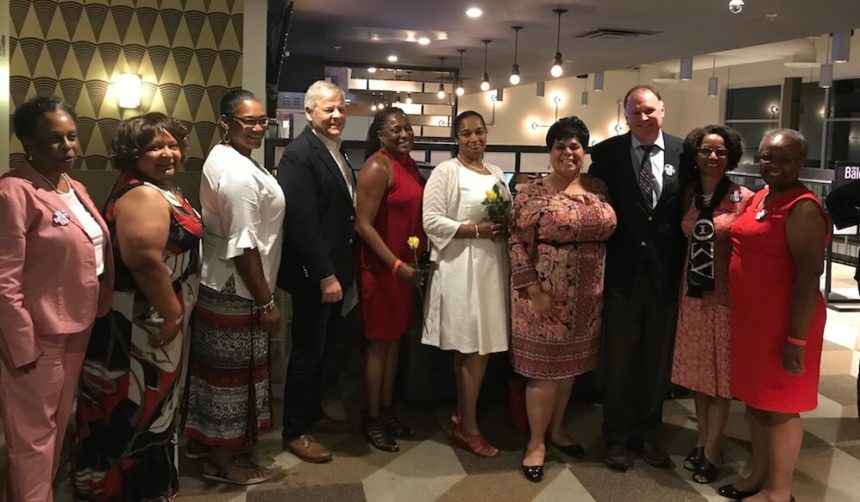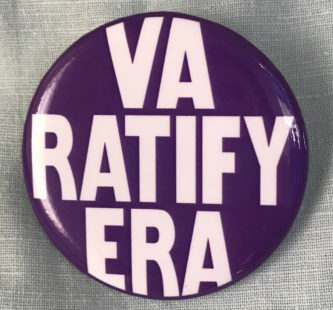Ten days ago, my wife and I attended a screening of “Iron Jawed Angels” in celebration of Women’s Equality Day. Filmed in Virginia in 2004, it tells the story of Alice Paul and her efforts to gain universal suffrage for American women in the early decades of the 20th century. Americans often see the suffragettes as privileged women in white dresses and great hats. The reality was more complex; many of these women endured considerable hardship and abuse. Women of color were involved in the fight, though the racial divisions of the day diminished their role in the historical record. The film chronicles Paul’s imprisonment and forced feeding during a hunger strike. Ultimately, Paul and her allies prevailed, and the nation added the 19th Amendment to the U.S. Constitution on August 26, 1920, guaranteeing women the right to vote.

At the showing of “Iron Jawed Angels,” about the effort to gain universal suffrage for American women. From left to right: Megan Tracy (board member of the local chapter of the League of Women Voters), Delegate David Toscano, State Senator Creigh Deeds, and Alisa Hefner (co-chair of the local ERA Task Force).
ERA Virginia Campaign
The film was shown as part of a statewide campaign (it was screened in at least seven other places in Virginia on August 26th) designed to push Virginia to become the 38th and final state to ratify the ERA as the 28th Amendment to the U.S. Constitution. Many Americans incorrectly believe the ERA is already part of the Constitution. And that’s understandable, because who would argue with these 24 words: “Equality of rights under the law shall not be denied or abridged by the United States or by any State on account of sex”?

David Toscano and Creigh Deeds with members from the Charlottesville Alumnae Chapter of Delta Sigma Theta Sorority, who were honored for their role in the equal rights struggle.
Unlike discrimination based on race, national origin, or religion, discrimination on the basis of sex is not protected at the highest level under the 14th Amendment’s equal protection clause. That means that women do not enjoy the same level of protection as do religious groups or racial minorities. The ERA is needed because:
- Women still earn substantially less than their male counterparts; women of color fare much worse.
- Poverty rates among women remain higher than men, and essential elements of women’s lives — personal economic opportunity and stability, equal pay for equal work — would improve with enactment of this amendment.
- Courts address discrimination against women using a different constitutional standard, thereby making enforcement of equality more challenging. The ERA would change that.
Ratification Process
Virginia’s ratification of the ERA is not complicated. Ratification is accomplished when the Virginia House and Senate both pass resolutions. The Governor is not required to do anything; once the resolution is passed, the ERA will be ratified. Yet this simple process has been difficult to implement. Since 2011, Democrats in the House of Delegates and the Virginia Senate have introduced 18 separate resolutions to ratify the ERA. Only five of the 18 resolutions have ever received a floor vote — all of those in the Senate — and none have ever been passed out of committee in the House of Delegates.
A New Opportunity?
 Next session could be dramatically different. Individual House and Senate Democrats have already filed resolutions to ratify the ERA, and these resolutions will likely be referred to the same committees. But now the House has 49 Democrats, and behind us are thousands of Virginians calling on our Republican colleagues to bring the resolutions to the floor for a vote. If your delegate or state senator serve on their chamber’s Privileges and Elections or Rules Committees, ask them to vote in favor of reporting the resolutions. Ask them to request a recorded vote for any votes taken on ERA resolutions in subcommittees or committees, so that every legislator can be held accountable for how he or she acted on the resolution.
Next session could be dramatically different. Individual House and Senate Democrats have already filed resolutions to ratify the ERA, and these resolutions will likely be referred to the same committees. But now the House has 49 Democrats, and behind us are thousands of Virginians calling on our Republican colleagues to bring the resolutions to the floor for a vote. If your delegate or state senator serve on their chamber’s Privileges and Elections or Rules Committees, ask them to vote in favor of reporting the resolutions. Ask them to request a recorded vote for any votes taken on ERA resolutions in subcommittees or committees, so that every legislator can be held accountable for how he or she acted on the resolution.
And I hope you’ll sign the House Democratic Caucus ERA petition so that we can show our colleagues across the aisle that it’s not just time for the ERA to become the 28th Amendment — it’s way past time.
